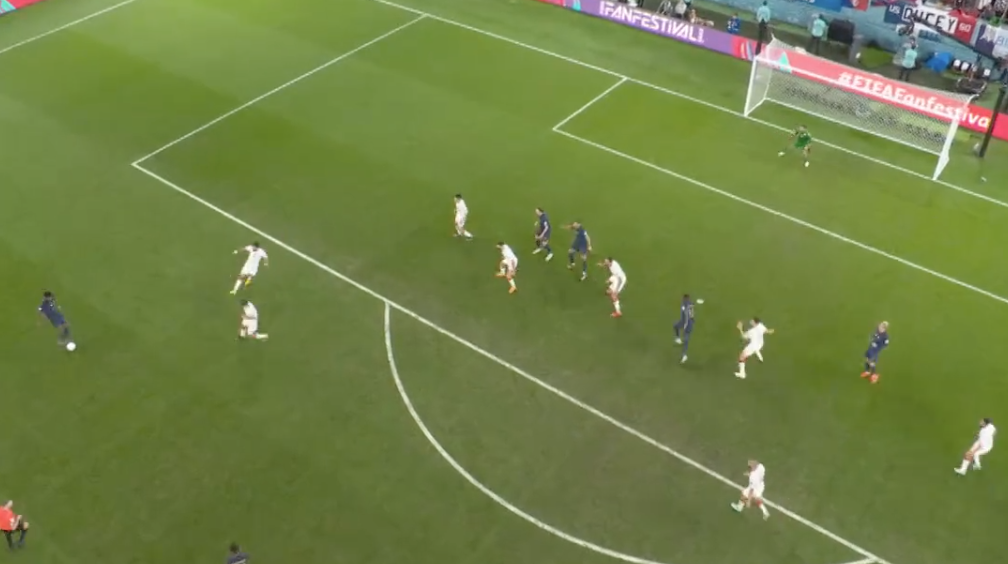

On the back of their shock 1-0 defeat to Tunisia in the 2022 FIFA World Cup Finals last night, the French Football Federation has lodged an official complaint with FIFA after they had what they believe was an equalising goal disallowed in the final few seconds of the game.
The French team are arguing that a procedural error was made by the referee Michael Conger that means that the goal should have stood.
In terms of how Group D stands, whether France lose the game 1-0, or draw it 1-1 does not affect the outcome of the group at all. France and Australia would still qualify in the same positions and Tunisia would still finish above Denmark in the group.
However, this is not a frivolous appeal at all and there is a hell of a lot more at stake for FIFA and the use of the VAR system than simply the award of a goal or not.
You can argue, why does this matter? If the award of the goal or not does not materially change how the group finished, then what is all the fuss?
Well, think about this: What happened if you had placed a bet on Tunisia earning a draw with France, or a 1-1 correct score bet with bet365 Sport? Would you be happy if your bet is a loser, when it could (or perhaps should) have been a winner?
There are also ramifications here for FIFA not just in terms of how VAR is used and the procedures followed, but how final scores are immutable and cannot be changed.
Now imagine you had played bet365’s Four Score Challenge and had put down a 1-1 draw for the France v Tunisia game and the fact that it finished 1-0 meant that you missed out on one of the Free Bet prizes, or even a £250 cash prize?
Suddenly, you can see why ensuring the result is the correct one matters a great deal for many more people than those invested in each of the teams.
Those are all real and serious issues in the current context, but what is really worrying for football fans, players and anyone with an interest in the game, is what would FIFA do if this had happened and it had a MAJOR impact on the teams competing in that group?
So before we examine some of the issues FIFA now face to resolve this, let’s explain exactly what happened.
In the game, Tunisia had taken the lead in the second half against France through a Wahbi Khazri finish and as the game moved into injury time, France were pressing for an equaliser.
With barely seconds remaining, France midfielder Aurielen Tchouameni put the ball into the box where Antoine Griezmann was waiting to fire the ball home. Referee Michael Conger originally awarded the goal to make it 1-1.
And this is where the technical mistake in the process occurred.
Rather than wait for VAR confirmation, the referee restarted the game which lasted just for a few seconds, after which Mr Conger blew the full-time whistle.
But by this point, the VAR official had notified the referee that he needed to look at the French goal for a potential offside.
When that review came through, the referee was advised that Griezmann was indeed offside from the original pass.
Mr Conger then disallowed the goal after the final whistle, meaning that Tunisia were declared the 1-0 winners, leaving the French team, and many onlookers perplexed as to what had just happened.
What is clear is that the rules for VAR decisions for offside when goals are scored were not followed in the correct procedure and that once the game restarted, the French goal, even though it was offside, should have stood.
Indeed the French Football Federation believe that they have a strong case for FIFA to change the result of the contest to a 1-1 draw.
However, this would open a huge can of worms for FIFA as the Laws of the Game state that a match result is not invalidated if decisions are made not to review an incident or in the wrong decisions are made involving the VAR.
How can a mess like this mean that FIFA are fortunate? Well FIFA have been in this case because the award of the goal, or not, does not materially affect any teams qualification or even their position in the group.
So whatever decision they take, and in my view they will let the 1-0 result stand, will not have any real impact.
But it could have been very, very different if the situation in the group had been in the balance.
We saw that last night when the two games in Group C were balanced on a knife edge with Mexico needing one more goal to go through at Poland’s expense.
Could you imagine the situation where an offside goal had wrongly been allowed in, say Mexico’s favour? Mexico would argue that the Laws of the Game state that the goal, even if it was offside should stand and that they should go through.
Poland would then argue that they should not be punished because a FIFA official failed to execute the VAR protocol properly and had they done so, then they would have progressed. They would effectively have been cheated out of the World Cup by an offside goal.
So as bad as this situation is and as trivial as it may seem, the French have highlighted an issue that the misapplication of the rules of VAR could well see the wrong team eliminated and the wrong team progress in a major tournament.
New Zealand referee Michael Conger is at the centre of this furore and there’s no doubt that his mistake has caused the issue.
However, FIFA’s decision to create teams of officials to run VAR, often that do not speak the same language and who have different levels of experience with the technology, puts the referee in an invidous position sometimes.
Referee’s are human too and people can make mistakes and it is wrong to put the entire blame on the official, especially when they are in the heat of a World Cup game with teams trying to qualify for the next stage of the tournament.
That said, it is abundantly clear that FIFA needs to work with match officials and VAR officials in order to ensure that situations like this do not happen again.
The problem FIFA have is whatever ruling they make on this matter, it is going to upset someone and going to be viewed as the wrong one by many.
Many feel that Griezmann wasn’t offside as the Tunisian defender, in Conger’s view, had not made a deliberate play on the ball, thus meaning the phase of play did not reset and that made Griezmann offside.
However, many fans feel that the defender, Monassar Talbi, did intentionally head the ball, which would have reset the phase of play and meant Griezmann was onside.
Furthermore, if FIFA rule the result remains 1-0, then they risk the wrath of the World Champions who feel that as VAR use was not applied correctly and the game restarted, the goal should stand.
But then if FIFA rule in favour of France and change the result to 1-1, then they go against their own Laws of the Game.
But as bad as the situation is, it could have been much worse for FIFA.

All contents are ©
Bet365 Bonus Code, Sports, Casino and Poker Sign up offers and News
18+ Worried about your gambling?
Gamcare - When the fun stops – STOP!